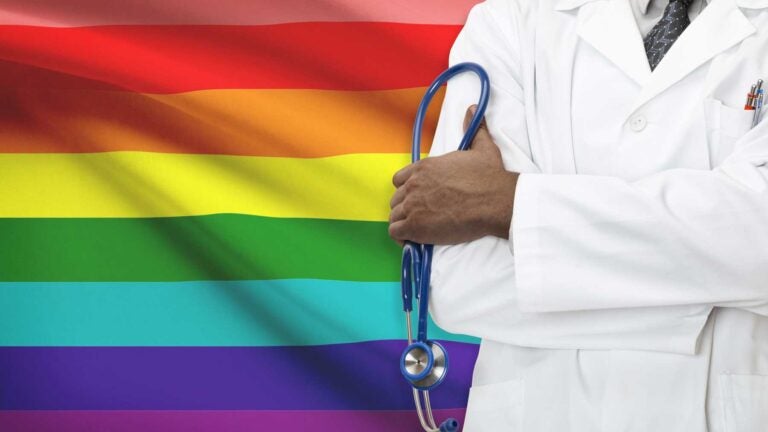
USC social work effort works to advance LGBT health research
Health Equity Initiative brings together experts to advance studies for a population whose members have dramatically higher rates of mental and behavioral health problems than their peers
Sexual and gender minorities — particularly LGBT individuals — experience significantly higher rates of mental and behavioral health problems than their heterosexual peers, yet efforts to address those disparities in the research world are lacking. The USC LGBT Health Equity Initiative is designed to counter that trend.
“This is a population with significant health disparities, and it is not a small group — the latest estimates indicate that approximately 10 percent of people don’t exclusively identify as heterosexual,” said Jeremy Goldbach, an assistant professor who organized the initiative at the USC Suzanne Dworak-Peck School of Social Work.
Around 35 percent of LGBT adolescents will experience homelessness, he noted. LGBT individuals also represent about 32 percent of children involved in the child welfare system and about 56 percent of the HIV-positive population.
I think it is evident we need a place at the table to talk about some of these intersections more thoughtfully.
Jeremy Goldbach
“Issues for LGBT people cut across the research effort placed on different populations, and I think it is evident we need a place at the table to talk about some of these intersections more thoughtfully,” Goldbach said.
The Health Equity Initiative brings together scholars, community leaders and experts in LGBT health to advance research, collaboration, training and outreach to build awareness and promote social change. Projects range from an evaluation of a crisis-service provider for sexual minority youths and young adults to the first U.S. Department of Defense-supported study on the behavioral health needs of active-duty service members who identify as LGBT.
Making the team
When Goldbach joined USC five years ago, he found many other faculty members and students at USC and other local institutions wanted to build partnerships focused on LGBT health, but had no infrastructure or organization to serve as a foundation for those efforts.
He envisioned a collaborative space that would provide opportunities for multidisciplinary interaction among social workers, psychologists, medical experts, nurses and other professionals interested in research and clinical work involving this relatively hidden and hard-to-reach population.
“There are so many disparities in so many areas,” Goldbach said. “Everybody can find a spot if they have an interest.”
Along with Sheree Schrager, a colleague from Children’s Hospital Los Angeles, and a handful of doctoral, master’s and undergraduate students at USC, Goldbach launched the initiative, building an online presence and hosting a monthly speaker series to spur interest and engagement.
End game
Although its funding stream so far is limited to specific research grants, the collaborative is geared toward a larger purpose.
The goal is ultimately to fund a real center for LGBT behavioral health research, training and skills-focused education.
Sheree Schrager
“The goal is ultimately to fund a real center for LGBT behavioral health research, training and skills-focused education,” said Schrager, director of research at CHLA’s Division of Hospital Medicine. “We’re slowly working our way up to that by applying for grants and building staff and research infrastructure.”
Schrager, a psychologist and expert in statistics and research methods, is working with Goldbach on a groundbreaking effort to create a measure of minority stress, essentially attempting to determine how adolescents and young adults who identify as LGBT experience stress.
The measure will help researchers assess how stressful experiences such as revealing their sexual identity affect LGBT individuals over time, allowing them to pinpoint when and how to intervene with support and resources to avoid health and psychological issues.
“There is knowledge out there among general health services researchers that minority stress is a real thing, that depression and suicide in this population is a real problem,” Schrager said. “A lot of minority groups, especially LGBT individuals, disproportionately experience those issues.”
Standing firm
Despite progress made in raising awareness of disparities among LGBT populations at the federal level, some concern exists that the current political atmosphere has created a less welcoming environment for research on those issues. Goldbach remains hopeful that federal institutes will continue to fund research projects focused on vulnerable groups.
“Like all marginalized groups, there is certainly fear and worry about things rolling back and losing protections that have been gained, but at least for now, things seem to be moving forward as usual,” he said. “We also have to consider sustainability that moves outside the federal government. We can’t be threatened with extinction every time the political winds shift.”
Efforts to push back against progress in this area can also serve a useful purpose, Schrager noted. For instance, in certain states that try to ban same-sex marriage or introduce similarly restrictive policies regarding the rights of LGBT populations, data show that the likelihood of suicide attempts are much higher.
“That leads to some natural conclusions,” she said. “This is a real public health problem and it’s one we can fix.”
